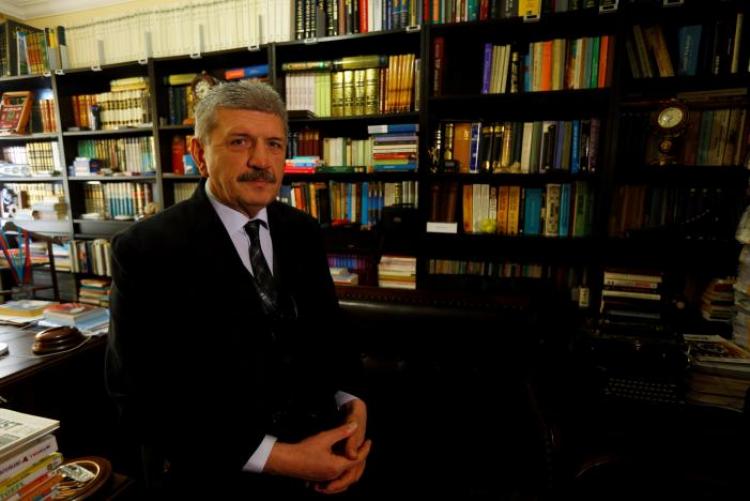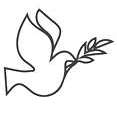
Standing at a blackboard in an Ankara park, Sevilay Celenk delivers her lecture, titled: "Resisting with Stories". Several hundred students huddle in heavy coats against winter cold to listen as she describes the fears and struggles that echo through literature across societies.
This small amphitheatre has become her unofficial classroom since she was fired from her post as a media and communications lecturer at Ankara University, one of nearly 5,000 academics dismissed following July's failed army coup.
The "intellectual massacre", as some academics have taken to describing it, has hit faculties from physics and biology to drama and politics at some of Turkey's best universities, chilling teachers and students alike.
Celenk, 50, said her occasional informal lectures and similar events held by fellow academics were a symbolic attempt to preserve contact with students "truly sad they are unable to see us at school".
"We took these dismissals as an opportunity to push the limits and bring university together with the streets.
"The teaching and research staff dismissed were the future of this university," she said. "The impact... will continue for several generations."
The mass firings of academics are just one part of a purge of professions including the police, army and judiciary in which more than 125,000 people have been fired and 40,000 arrested following the coup attempt that killed nearly 250 people.
Rights groups accuse President Tayyip Erdogan, now seeking popular support for greater powers, of using a state of emergency declared after the coup to quash political dissent.
Ankara University's political science and law faculties were stripped of more than 70 of their teachers in a February decree on dismissals. The drama department lost more than half of its 11-member staff. The university declined to comment.
Students say they did not sign up to study with only the rump faculty left behind.
"We had chosen this university because of what its teachers promised and to work with them," said Aylime Asli Demir, a political science student in a classroom at Ankara University. "This is no longer the place we enrolled."
Erdogan says a clean sweep of conspirators and sympathisers is necessary following the putsch attempt. He says losses to academic staff will quickly be made good.
"If they are involved in affairs that will lead to my country being divided and have links with terrorist groups....Of course they have to pay the price," he told reporters on his return from a trip to the Gulf in February.
He blames the attempted coup on Fethullah Gulen, an exiled cleric and former ally of the president who the authorities say infiltrated supporters into professions throughout the country and plotted a takeover. Gulen, who lives in the United States, denies any role in the plot.
A paragraph in the Official Gazette describes the banned academics as among those having "suspected links to terrorist organisations and structures presenting a threat to national security". Many say they have nothing to do with Gulen's movement, and little idea how they ended up on the list.
The dismissals are in principle open to appeal but a special commission envisaged has yet to be formed.
SILENCE DISSENT
Cihangir Islam, a devout Muslim medic and rights activist, says that far from being a coup supporter, he was among tens of thousands who took to the streets to resist it.
"What is the measure here?" Islam said in his Istanbul home. "By what criteria have they sacked people from their jobs?"
Instead, he appears to have been targeted over an issue unrelated to the attempted putsch: he expressed support for a petition signed by more than 1,000 academics last year criticising army operations against Kurdish militants in the southeast.
"It is a project to silence all dissident voices within the academy," said Murat Sevinc, recently dismissed from Ankara University's Political Science faculty. "The government has seen you can silence 100 academics by firing only one."
International academic contacts have come under pressure. Professor of constitutional law Ibrahim Kaboglu, for example, has been barred from travelling to Paris where he was due to teach as a guest lecturer at the Sorbonne University. He told Hurriyet daily he might now hold sessions via Skype.
The EU-funded Jean Monnet Scholarship Programme, which allowed hundreds of Turkish students to study in Europe, has been cancelled for the 2016-2017 year.
Businesses have already expressed concern about Turkish education in general, highlighting the need for an open minded system that encourages debate and promotes innovation.
"The future of our country is dependant on the quality of education of our youth," Tuncay Ozilhan, head of the Anadolu Group business, said in a recent speech. "Only societies which are free and under the guarantee of law can be progressive, creative and entrepreneurial in science, art and economy."
Erdogan towers still over all would-be political rivals and his crackdown, at least in its early stages, commanded broad support in a country shaken by militant Islamist and Kurdish rebel attacks as well as the putsch. But as the purge has broadened to include leftists, secular academics, unruly journalists, even musicians and sportsmen, scepticism has grown.
Academic life in Turkey was tumultuous in past decades, with intellectuals caught up in political maelstroms that saw four military takeovers, tensions between the secularist army and Islamists, and battles between leftists and nationalists.
But after the start of European Union accession talks in 2004, new funding ushered in modern and well-equipped research labs, encouraging students who previously would have studied abroad in the United States or Europe to return to Turkey.
That progress is now in jeopardy, some academics say.
"Current circumstances...make it very hard for young and bright Turkish researchers to return or continue their studies here," said astrophysicist Ali Alpar, President of the Science Academy, an independent non-governmental organisation.
Celenk said she is well aware her lectures in the park may anger the authorities, but says that is a risk she is willing to take to keep teaching.
"Of course, this will be seen as a threat by those who take our presence at the university as a threat," she said. "But we are aware the struggle for democracy, peace and freedoms have a price."
(Reporting by Humeyra Pamuk; editing by Ralph Boulton and Peter Graff)
